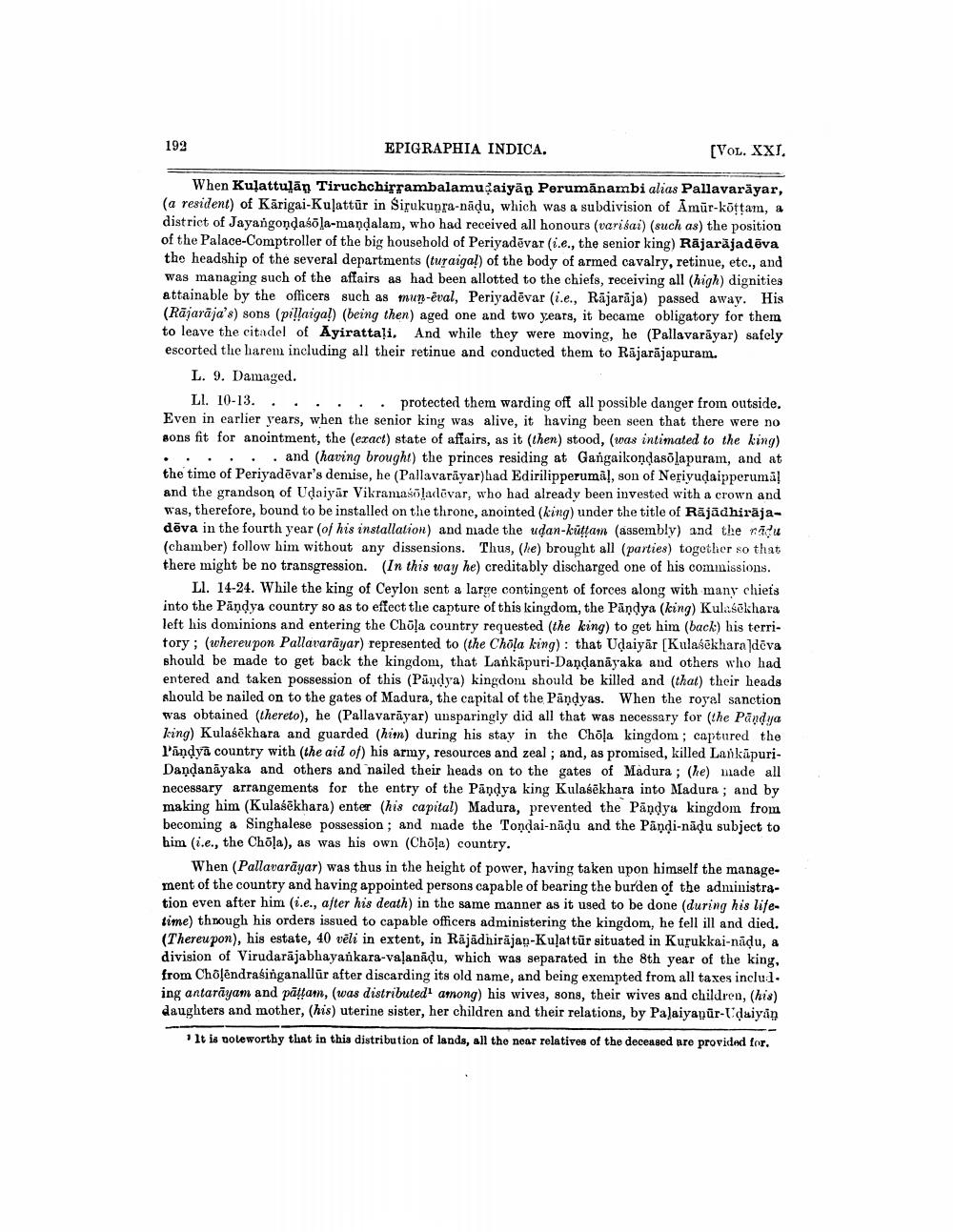________________
192
EPIGRAPHIA INDICA.
[VOL. XXI.
When Kulattulāņ Tiruchchirrambalamudaiyan Perumanambi alias Pallavarayar, (a resident) of Kārigai-Kusattur in Sigukupra-nādu, which was a subdivision of Amūr-köttam, a district of Jayangondaśõla-mandalam, who had received all honours (varišai) (such as) the position of the Palace-Comptroller of the big household of Periyadēvar (i.e., the senior king) Rājarājadēva the headship of the several departments (turaiga!) of the body of armed cavalry, retinue, etc., and was managing such of the affairs as had been allotted to the chiefs, receiving all (high) dignities attainable by the officers such as mum-eval, Periyadëvar (ie., Rājarāja) passed away. His (Rājarāja's) sons (pillaiga!) (being then) aged one and two years, it became obligatory for them to leave the citadel of Ayirattaļi. And while they were moving, he (Pallavariyar) safely escorted the harem including all their retinue and conducted them to Rājarājapuram.
L. 9. Damaged.
Ll. 10-13. . . . . . . protected them warding off all possible danger from outside. Even in earlier years, when the senior king was alive, it having been seen that there were no sons fit for anointment, the (exact) state of affairs, as it (then) stood, (was intimated to the king) . . . . . . and having brought) the princes residing at Gangaikondasõlapuram, and at the time of Periyadēvar's demise, he (Pallavarāyar)had Edirilipperumal, son of Neriyudaipperumā! and the grandson of Udaiyar Vikramasiladovar, who had already been invested with a crown and was, therefore, bound to be installed on the throne, anointed (king) under the title of Rājādhirajadēva in the fourth year (of his installation) and made the udan-küttam (assembly) and the radu (chamber) follow him without any dissensions. Thus, (he) brought all (parties) together so that there might be no transgression. (In this way he creditably discharged one of his commissions.
LI. 14-24. While the king of Ceylon sent a large contingent of forces along with many chiets into the Pandya country so as to effect the capture of this kingdom, the Pandya (king) Kulasekhara left his dominions and entering the Chöļa country requested (the king) to get him (back) his territory ; (whereupon Pallavarāyar) represented to the Chola king): that Udaiyar (Kulasekharaldēva should be made to get back the kingdom, that Larkāpuri-Dandanayaka and others who had entered and taken possession of this (Pandya) kingdon should be killed and (that) their heads should be nailed on to the gates of Madura, the capital of the Pandyas. When the royal sanction was obtained (thereto), he (Pallavarāyar) unsparingly did all that was necessary for the Pandya king) Kulasēkhara and guarded (him) during his stay in the Chola kingdom ; captured the l'andya country with the aid of his army, resources and zeal; and, as promised, killed LankūpuriDandanayaka and others and nailed their heads on to the gates of Madura ; (he) made all necessary arrangements for the entry of the Pāņdya king Kulasekhara into Madura ; and by making him (Kulaśēkhara) enter (his capital) Madura, prevented the Pandya kingdom from becoming a Singhalese possession; and made the Tondai-nadu and the Pandi-nādu subject to him (i.e., the Chola), as was his own (Chole) country.
When (Pallavarāyar) was thus in the height of power, having taken upon himself the management of the country and having appointed persons capable of bearing the burden of the administration even after him (i.e., after his death) in the same manner as it used to be done (during his lifetime) through his orders issued to capable officers administering the kingdom, he fell ill and died. (Thereupon), his estate, 40 vēli in extent, in Rājādhirajap-Kuļattür situated in Kurukkai-nidu, a division of Virudarājabhayankara-vaļanādu, which was separated in the 8th year of the king, from Choļendrasinganallur after discarding its old name, and being exempted from all taxes includ. ing antarāyam and pattam, (was distributed among) his wives, sons, their wives and children, (his) daughters and mother, (his) uterine sister, her children and their relations, by Palaiyaņūr-Udaiyan
1 It is noteworthy that in this distribution of lands, all the near relatives of the deceased are provided for.




